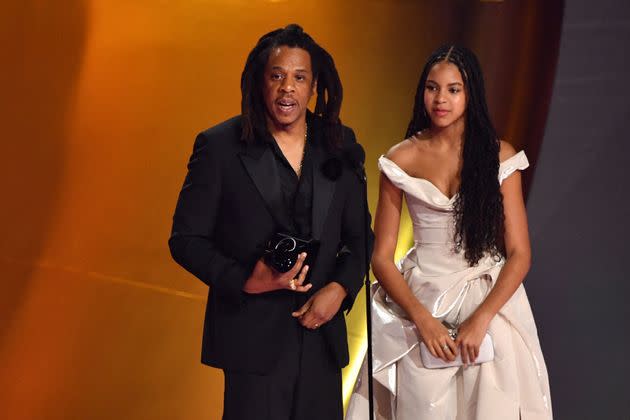Jay-Z Shook Things Up With His Grammy Speech. Now What?
- Oops!Something went wrong.Please try again later.
- Oops!Something went wrong.Please try again later.

Rapper Jay-Z (L) accepts the Dr. Dre Global Impact Award alongside his daughter Blue Ivy on stage during the 66th Annual Grammy Awards at the Crypto.com Arena in Los Angeles on Feb. 4, 2024.
“When I get nervous,” Jay-Z said, “I tell the truth.”
The Brooklyn rapper didn’t lie about that. For a little more than three minutes straight on Sunday, he held the Recording Academy’s feet to the fire on their own platform.
Established as an award ceremony dedicated to uplifting excellence in music and audio, the Grammys have spent much of their existence missing the mark. This is especially true when it comes to Black artists and genres.
So when Jay-Z got on stage to accept the Dr. Dre Global Impact Award, it felt cathartic to watch him say exactly what many of us had been thinking. And to say it on their turf was significant.
He specifically called out the Recording Academy for never awarding his wife, Beyoncé Knowles-Carter, with the coveted Album of the Year award.
“She has more Grammys than everyone and never won Album of the Year,” he said. “So even by your own metrics, that doesn’t work. Think about that. The most Grammys never won Album of the Year. That doesn’t work.”
With their Grammy-winning daughter, Blue Ivy Carter, standing beside him on stage, the hip-hop legend continued to read the institution for filth.
“Some of you are going to go home tonight and feel like you’ve been robbed,” he said. “Some of you may get robbed. Some of you don’t belong in the category.”
Hov, who’s been vocal about boycotting the Grammys in the past (despite admitting to watching one year), may have felt robbed in 2018 when his “4:44” album received eight nominations but was completely shut out during the ceremony.
And he’s not the only artist who has spoken out about the show. Kelly Rowland praised Jay for his speech, saying that the Grammys have to “evolve.” Tyler, the Creator, spoke about the unfairness of how Black artists are categorized in 2020.
What needs to be more examined is how the Grammys got here and how they address bias at the award show. Did the message even resonate with the powers that be? Is it even worth fixing, or should we just stick to the award shows that celebrate us?
The irony of Jay delivering such poignant remarks is that he was able to make them because the Grammys named an award after an accused repeat abuser.
That award, established only in 2022, exists because the Grammys don’t give a damn about hip-hop enough to properly categorize it or televise it. Similar to what the Oscars have done, the Grammys have effectively created a consolation prize for the marginalized trailblazers whom they’ve refused to recognize for decades. I dig into this a bit deeper on this week’s episode of “I Know That’s Right” with the author and founder of The Gumbo, Nadirah Simmons.
This isn’t just about hip-hop. This is about Afrobeat, Latin music and the genres that the “mainstream” overlooks. This is about Victoria Monét, who’s been making music for 15 years, finally getting her recognition under the Best New Artist category. This is about the economic impact that talented up-and-coming artists are robbed of because they simply just aren’t on the voting body’s limited radar.
Jay-Z encouraged artists to keep grinding and said that their time will come. But what about those whose time never comes?
In a recent NPR article, Sidney Madden wrote, “The contradiction that lies in Jay’s speech is trusting the institution at all.”
The fact is that the Grammys weren’t created with inclusivity in mind. In fact, for decades, Black artists’ music was only excellent if white artists were performing it.
Until the Recording Academy can reckon with that directly, and not with special honors that cover their tail each year, the things they do in the name of diversity will just be a bandaid.
If you want more interviews, pop culture rundowns and conversations too layered for a social media thread to tackle, subscribe to “I Know That’s Right.” With new episodes dropping each week, this show is sure to keep you entertained, informed and shouting “I know that’s right” every now and then.
